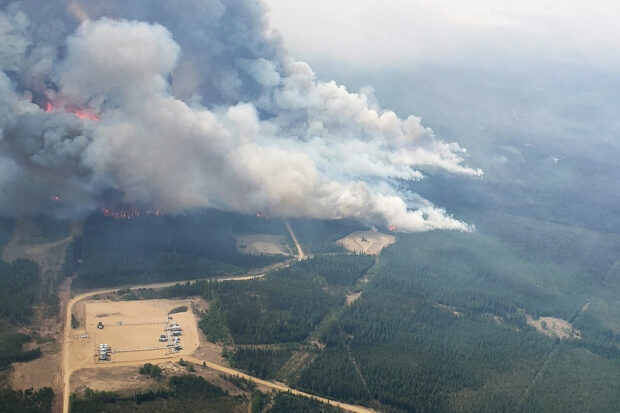Wildfire risk spurs Alberta park closures ahead of holiday weekend

Smoke rises from areas on the southeast side of wildfire EWF-035, part of the Deep Creek Wildfire Complex which is being tackled by helicopters near Shining Bank, Alberta, Canada May 19, 2023. Alberta Wildfire/Handout via REUTERS
OTTAWA — Authorities in Canada’s main oil-producing province of Alberta have closed some parks and campgrounds, and are urging residents to avoid activities that could enrage wildfires to avoid straining firefighting resources over the holiday weekend.
Traditionally, residents spend the Victoria Day long weekend outside as families take advantage of the warmer weather to go camping or enjoy other outdoor activities.
The long weekend in May usually sees an uptick in seasonal wildfires, some of which are accidentally caused by people, according to Alberta Wildfire.
This year, however, record-high temperatures and tinder-dry vegetation brought about an early and intense onset of the wildfire season in western Canada.
READ: Canada’s Alberta blanketed by smoke as wildfire battle continues
Article continues after this advertisementWith abnormally hot and dry weather forecast until at least early next week, Alberta has preventively closed some provincial parks and campgrounds for the weekend and imposed a fire ban.
Article continues after this advertisement“This weekend is going to be hot and dry,” Colin Blair, executive director of the Alberta Emergency Management Agency, said on Friday.
“We are strongly encouraging Albertans to postpone plans to visit public lands this weekend,” he told a daily briefing.
Alberta has been hit the hardest, with some 275 houses, businesses, and other properties damaged and more than 10,000 people forced out of their homes as of Friday, May 19.
Officials have warned that more wildfires could spread in the next few hot and dry days, even as firefighters make progress in tackling widespread blazes that have slowed the outflow of natural gas from Canada into the United States, spiking prices.
READ: Calgary air quality deteriorates as wildfires rage in Western Canada
Over the past couple of weeks, the average amount of gas flowing from Canada to the United States has averaged just 7.1 billion cubic feet per day (bcfd) as wildfires in Alberta caused some producers to shut oil and gas output and pipeline flows, according to Refinitiv.
That is well below the 8.4-bcfd average amount of gas exported since the start of the year and 9.0-bcfd in 2022. About 8% of the total gas consumed in or exported from the U.S. comes from Canada.
On a daily basis, Canadian gas exports to the US were on track to rise to 7.3 bcfd on Friday, up from a 25-month low of 6.4 bcfd on Wednesday.
More than 2,800 firefighters, including personnel from Canadian and US agencies and the Canadian army, were battling about 93 active wildfires on Friday.
READ: Canada’s Alberta faces more wildfires amid hot, dry weather
The wildfires, significantly more than usual this year, have put Alberta Premier Danielle Smith’s disaster management skills – as well as her party’s policies – under the microscope ahead of the provincial election on May 29.
Consultancy firm Rystad Energy has estimated nearly 2.7 million barrels per day of Alberta oil sands production in May is at risk in “very high” or “extreme” wildfire danger rating zones.